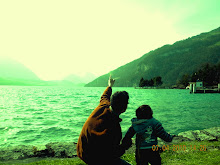 essity. It is the food of genius’. Though the concept of ‘evil’ has changed a bit since Thomas’ time (both the writer and the saint), the idea remains as powerful. In Visconti’s film version, the protagonist, a musician of strict morality who believed in leading ‘a balanced life’ and art as ‘an abstraction’ (based on the composer Gustav Mahler) is mocked by his friend (alter ego) as having achieved the ‘perfect balance’ in his life. ‘Now the art and the artist has become one’, his friend jeers at him, ‘both hitting rock-bottom.’
essity. It is the food of genius’. Though the concept of ‘evil’ has changed a bit since Thomas’ time (both the writer and the saint), the idea remains as powerful. In Visconti’s film version, the protagonist, a musician of strict morality who believed in leading ‘a balanced life’ and art as ‘an abstraction’ (based on the composer Gustav Mahler) is mocked by his friend (alter ego) as having achieved the ‘perfect balance’ in his life. ‘Now the art and the artist has become one’, his friend jeers at him, ‘both hitting rock-bottom.’Always drawn towards the conflict of the rational Apollonian mind vs. the self destructive Dionysian creativity (thanks to Nietzsche who I guess first pointed out the classical conflict), Mann’s lines set me thinking once again. I could immediately recall some famous examples of art (and artists) shining through the depths of darkness:
- Dostoevsky’s guilt stricken womanising (he toured Europe with a girl half his age while his first wife was dying of tuberculosis), compulsive gambling (which ruined him again and again), and amidst all these (topped by his ever increasing epileptic seizures), managing to create some of the greatest masterpieces ever written
- Mozart’s pompous, boastful and showy shallowness, his perverted jokes, lies, obsessive flirting, secretive gambling - and The Figaro, The Magic Flute, the Don Giovanni...
- Einstein’s womanizing, his cruelty to his own children and complete apathy towards his wives and many mistresses
- Goethe, ‘that venerable saint from Germany’ writing lustful poems (Marienbad Elegy – thanks to Google) about his sexual desire for an 18-year-old boy. This I guess was when he was in his sixties or seventies
- Da Vinci’s relationship with younger boys whom he took as pupils and then went on to exploit
- Oscar Wilde's love affair with blackmailers and male prostitutes, young choir-boys, crossdressers, and homosexual brothels of nineteenth century London contrasts beautifully to his immortal creations. In a recent visit to his grave in Paris, I found these words written: ‘Here lies the best man that ever lived’ – I couldn't have agreed more
- Picasso’s passion for women was probably outmatched only by his passion for art
- Our own Satyajit Ray no less; though unnecessarily portrayed as the ‘picture-perfect family man’ by the obsessive Bengali media - Ray's work, like all the above examples, I guess, could stand on it's own
The more I think about it, the more the distinctions get blurred into a complex psycho-causality which is way beyond the capability of my mediocre mind to decipher. Hesse had made an attempt in his novel ‘Narcissus and Goldmund’. Mann himself wrote the story after being drawn to young teenage Polish boy in a Venice hotel.
Picture: A Roman sculpture of Venus at the British Museum
October 28, 2009








